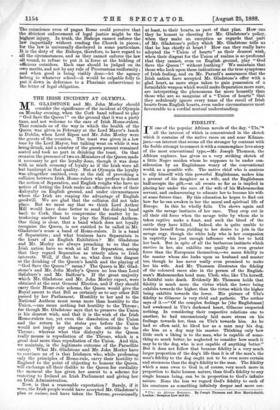1HE IRISH INCIDENT AT OLYMPIA.
MR. GLADSTONE and Mr. John Morley should consider the significance of the incident at Olympia on Monday evening, when the Cork band refused to play "God Save the Queen !" on the ground that it was a party tune, and not welcome to the ears of Irish Home-rulers. That reminds us of the way in which the health of the Queen was given in February at the Lord Mayor's lunch in Dublin, when Lord Ripon and Mr. John Morley were -the guests of the occasion. The toast was given in a low tone by the Lord Mayor, but talking went on while it was being drunk, and a number of the guests present remained seated and took no part in drinking the toast. On that occasion the presence of two ex-Ministers of the Queen made it necessary.to get the loyalty clone, though it was done with as much economy of loyalty as if the Irish were all but bankrupt in that quality. But at Olympia the loyalty -was altogether omitted, even at the risk of provoking a collision between Irish Home-rulers who profess to detest the notion of Separation, and English roughs who have no notion of letting the Irish make an offensive show of their disloyalty on English ground, and under circumstances -where the Irish are reaping the advantage of English goodwill. We are glad that the collision did not take place. But we must say that we think Lord Arthur Hill would have done better to send the disloyal band back to Cork, than to compromise the matter by in- troducing another band to play the National Anthem. One thing is clear, that a band which does not loyally recognise the Queen, is not entitled to be called in Mr. Gladstone's sense a band of Home-rulers. It is a band of Separatists ; and what business have Separatists in the heart of an English Exhibition? Mr. Gladstone and Mr. Morley are always preaching to us that the Irish nation have no wish at all for Separation, seeing that they regard Separation as utterly alien to Irish interests. Well, if that be so, what does this disgust at the drinking of the Queen's health and the playing of "God Save the Queen !" mean ? The Queen is Mr. Glad- stone's and Mr. John Morley's Queen no less than Lord Salisbury's and Mr. Balfour's. If the great majority -which Mr. Gladstone and Mr. John Morley expect, were obtained at the next General Election, and if they should carry their Home-rule scheme, the Queen would give the Royal assent to that Bill as certainly as to any other Bill passed by her Parliament. Hostility to her and to the National Anthem must mean more than hostility to the Union,—can mean nothing but hostility to the Throne ; for though Mr. Gladstone says that to preserve the Union is his dearest wish, and that it is the wish of the Irish Home-rulers too, yet even the dissolution of the Union and the return to the status quo before the Union would not imply any change in the attitude to the 'Throne; whereas what this disloyalty to the Queen really means is repudiation of the Throne, which is a great deal more than repudiation of the Union. And this, we maintain, is the legitimate outcome of the Parnellite outcry. What Mr. Gladstone and Mr. John Morley have to convince us of is that Irishmen who, while professing only the principles of Home-rule, carry their hostility to England to the point of objecting to honour the Queen, -will exchange all their dislike to the Queen for cordiality the moment she has given her assent to a scheme for restoring to Ireland an Irish Parliament and giving her an Irish Administration.
Now, is that a reasonable expectation ? Surely, if it -were, the Irish people would have accepted Mr. Gladstone's plan ex anima, and have taken the Throne, provisionally at least, to their hearts, as part of that plan. How can they be honest in cheering for Mr. Gladstone's policy, when they make an exception as regards that part of Mr. Gladstone's policy which Mr. Gladstone tells us that he has chiefly at heart ? How can they really have adopted the "Union of hearts" as their dearest wish, when their disgust for the Union of realms is so profound that they cannot, even on English ground, play "God Save the Queen !" without loathing? We maintain that those who look upon these indications as the true symptoms of Irish feeling, and on Mr. Parnell's assurances that the Irish nation have accepted. Mr. Gladstone's offer with a glad heart, as mere steps taken to gain possession of a formidable weapon which would make Separation more sure, are interpreting the phenomena far more honestly than those who are so sanguine of a "Union of hearts" that they sedulously ignore every trace of the recoil of Irish hearts from English hearts, even under circumstances most favourable to a cordial mutual understanding.


































 Previous page
Previous page